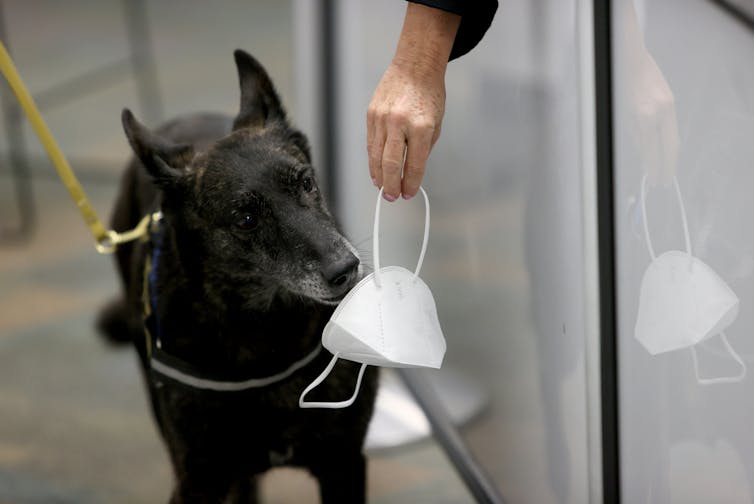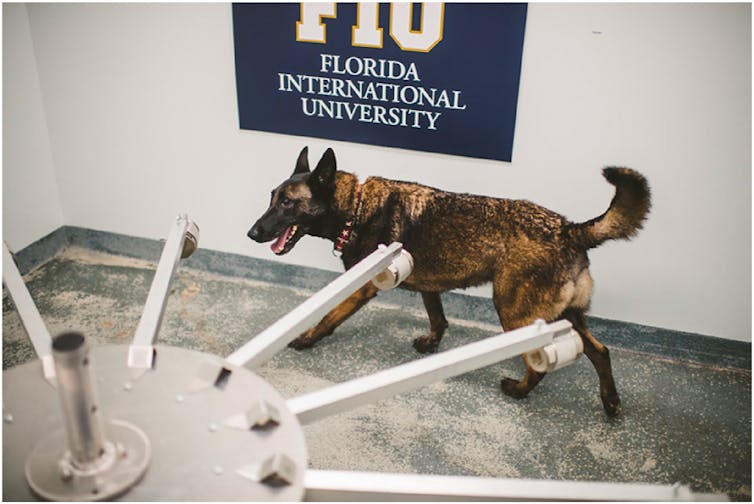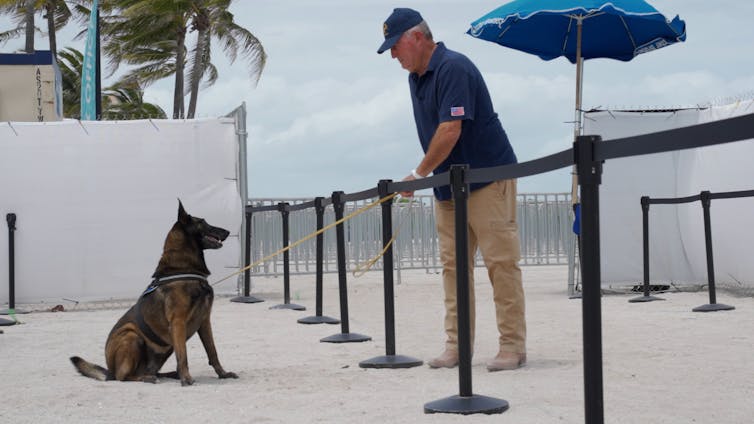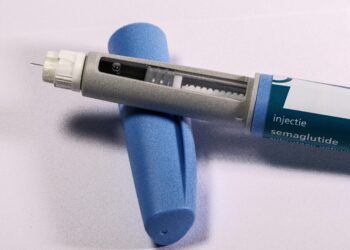A team of forensic researchers explain the science

Joe Raedle/Staff/Getty Images North America
Kenneth G. Furton, Florida International University; Julian Mendel, Florida International University, and Kelvin J. Frank Jr., Florida International University
With up to 300 million scent receptors, dogs are among the best smell detectors in the animal world. The human nose, by comparison, contains only around 6 million scent receptors. Dog brains also devote 40% more brain space than humans to analyzing odors.
That’s why people train dogs to search for diverse targets via smell, from illegal drugs and agricultural pests to missing persons, endangered wildlife species and more. Dogs accomplish this by successfully recognizing the odors of substances called volatile organic compounds that are specifically associated with these targets. Not only can trained dogs detect these volatile organic compounds, but oftentimes they can do it with greater sensitivity than analytical instruments.
Volatile organic compounds can be produced by living organisms as well as by natural or synthetic materials. In humans, they are produced by the body’s metabolic activity, then enter the bloodstream and are finally released into the air through blood, urine, feces, skin or breath.
Scientists have found that dogs can be trained to successfully recognize unique volatile organic compounds, called “biomarkers,” in the exhaled breath of patients with certain diseases or chronic medical conditions, including cancer and diabetes, as well as for pre-seizure detection in epileptic individuals.
Our team of canine scent scientists at Florida International University wanted to figure out whether COVID-19 is among the diseases that trained dogs can detect. Our recent study, which we carried out with our colleague, forensic biologist DeEtta Mills, confirms that it is.
We believe that dogs hold great promise as a rapid screening method that, used with other measures such as rapid tests, can help stop COVID-19 spread and end the pandemic. Some of the dogs trained during our research have already proved their abilities at airports and public events.
Training dogs to detect COVID-19
For several decades, Florida International University’s International Forensic Research Institute has been a global institution for research on detector dogs. The majority of this research has focused on identifying the specific volatile organic compounds that natural or synthetic materials and living organisms produce and which dogs can be trained to detect.
In our recent research, we hypothesized that people infected with COVID-19 would release specific volatile organic compounds, and that a well-trained odor detection dog would be able to tell these biomarkers apart from other volatile organic compounds.
So in collaboration with Baptist Health South Florida, a nonprofit health care organization, we obtained face masks from hospitalized patients with confirmed COVID-19 diagnoses, as well as from those who tested negative for COVID-19.
We then trained four dogs to respond to COVID-19 positive masks, while ignoring COVID-19 negative masks and unused masks. In the process, the dogs learned to tell the difference between biomarkers originating from COVID-19 breath and from non-COVID-19 breath.
One of the training tools we used was a scent detection wheel. We placed both COVID-19 positive and COVID-19 negative masks in cans with small holes in the lids, which were attached to the ends of the wheel’s arms. The dogs then walked around the wheel sniffing the volatile organic compounds coming out of these holes.

Julian Mendel/Florida State University, CC BY-ND
After 40 double-blind trials – meaning that the people training the dogs didn’t know which masks were which –
we found that each of the four dogs in this study accurately detected COVID-19 positive masks more than 90% of the time.
Mac, a Terrier mix, got it right in 96.2% of attempts. Cobra, a Belgian Malinois, was correct 99.4% of the time. One Betta, a Dutch Shepherd, got it right in 98.1% of attempts, and Hubble, a Border Collie mix, 96.3% of the time.
After the study, Cobra and One Betta went to work at the State Emergency Operation Command Center, in Tallahassee, Florida, screening for COVID-19 on surfaces. In May 2021, both dogs also put their COVID-19 detection skills to work at the annual Food and Wine Festival in Miami.
In September 2021, Cobra and One Betta worked for two separate 30-day pilot studies at Miami International Airport, screening individuals for COVID-19.
Other agencies are beginning to adopt FIU’s methods for training dogs to detect COVID-19. Recently, with FIU’s assistance, the Bristol County Sheriff’s Office in Massachusetts started putting two young labradors named Duke and Huntah to work detecting COVID-19. These two dogs are also sniffing for COVID-19 at facilities in the nearby Freetown-Lakeville Regional School District.
Next steps in COVID-19 detection
Now that we know dogs can be trained to sniff out COVID-19, our team hopes to identify the exact volatile organic compounds – the biomarkers – that they’re detecting. To accomplish this, we are continuing to analyze both COVID-19 positive masks and COVID-19 negative masks in the laboratory.

Julian Mendel/Florida International University, CC BY-ND
Pinning down which biomarkers are linked to COVID-19 will help in developing materials and training aids for teaching other dogs how to detect the disease.
[Over 140,000 readers rely on The Conversation’s newsletters to understand the world. Sign up today.]
It may also contribute to developing COVID-19 sensors for use in odor-detecting devices – which might then join rapid testing and sniffer dogs like One Betta, Hubble, Mac and Cobra in helping get the pandemic under control.
Kenneth G. Furton, Professor of Chemistry and Biochemistry, Florida International University; Julian Mendel, Research Assistant Professor in Forensic Research, Florida International University, and Kelvin J. Frank Jr., Forensic Science Professor / Postdoctoral Research Associate, Florida International University
This article is republished from The Conversation under a Creative Commons license. Read the original article.
















